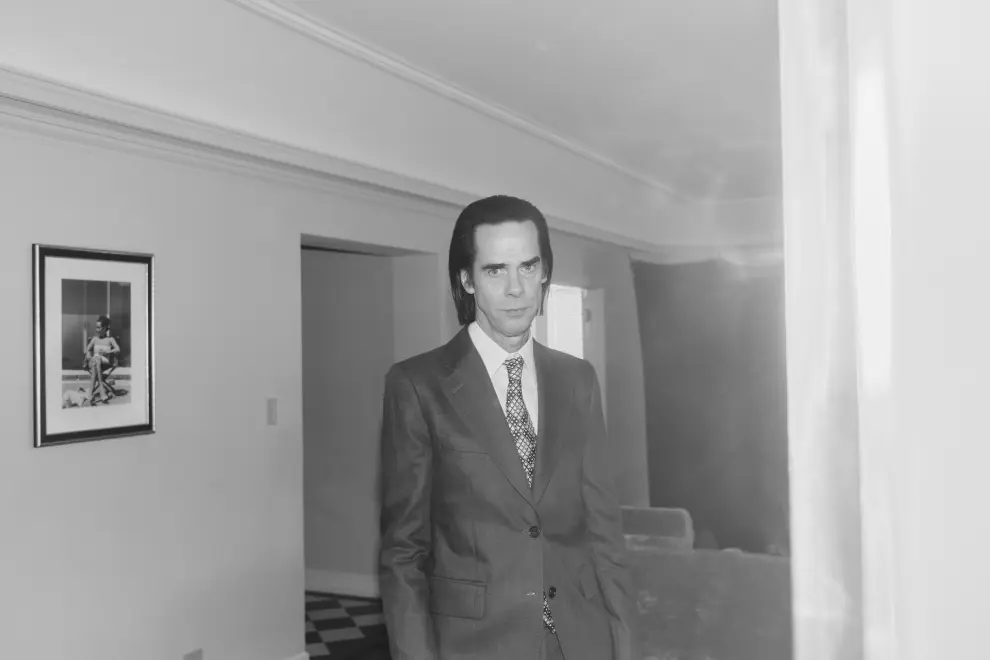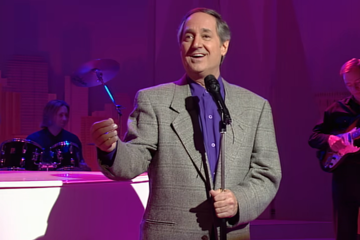 Nick Cave & The Bad Seeds
Nick Cave & The Bad SeedsMore than 50 years since venerated Australian musician Nick Cave set out rattling cages as frontman of The Birthday Party whilst still wearing the uniform of his Melbourne high school, on his new album Wild God - the 18th such collection shared whilst backed by his long-term cohorts The Bad Seeds - he’s showing a side of himself that we’ve seldom been privy to before.
The last two Bad Seeds albums - the pain-wracked Skeleton Tree (2016) and grief rumination Ghosteen (2019) - were both direct reactions to the tragic loss of Cave’s 15-year-old son Arthur in 2015. Then, since their release, the singer’s grief was only compounded when he further lost his 31-year-old son Jethro in 2022. A double blow no parent should be forced to face down, let alone so publicly.
Like its predecessors, Wild God still finds him processing death and loss and grief and pain, but now it’s from a vantage point further down the healing path, and - unlike the raw anguish of those previous statements - Cave is now wrestling with acceptance and even joy, not only for what was but what is now and what could be down the track.
At times throughout Wild God, he doesn’t just dabble in transcendence and jubilation; he fully embraces and revels in it. This is no doubt, in part, because these metaphorical blue skies must seem magnified beyond belief after Cave’s recent years spent mired in darkness.
Don't miss a beat with our FREE daily newsletter
Throughout the album, the liberal use of orchestras and choirs helps grandiosely replicate these feelings. The nihilism of his youth is now stripped away entirely and replaced by a newfound appreciation for life and living, the music at times swelling, pulsing, and radiating beauty and vitality.
Behind him, as usual - apart from the recent pandemic album Carnage (2021), credited to just Cave and his current chief sidekick Warren Ellis (of late found destroying it with his own band, the Dirty Three) - stand his trusted Bad Seeds. The line-up of this incredible outfit has changed so much over time that it’s like that adage about your grandpa’s axe: change never diminishes their collective chemistry and musicality. This current incarnation is in fine fettle and seems to be relishing being back and creating art together.
They intuitively know how to collectively best serve each song their leader brings them - whether using restraint when things need to be stripped-back and sparse or going into full beast mode when it’s time to get raucous - and pleasingly throughout Wild God, they get to show both of these extreme skillsets on the regular, everything they touch stamped by experience and rendered into their own sophisticated style.
Aside from the orchestral and choral embellishments, Radiohead’s Colin Greenwood - a member of Cave’s solo touring band - adds some bass on the album (fear not, Martin Casey is still present and accounted for, as is his rhythm section partner-in-crime Thomas Whydler), and Luis Almau adds some acoustic and nylon string guitar (Almau also recorded the album over two separate sessions in London and Provence).
From a lyrical perspective, a surface scan of the various narratives reveals that Cave is still utilising plenty of his favoured gothic, noir tropes - across the ten tracks we meet Gods, spirits, vampires, ghosts, zombies, devils and ogres as well as dealing with concepts like death, evil, rape, pillage and otherworldly vistas such as castle ruins and strawberry moons - only now such spectres of darkness are routinely positioned as being in the past not the future, perhaps not defeated but at least returned to their realms.
Highlights abound throughout Wild God. The epic title track returns us to Jubilee Street - where we first visited on 2013’s Push The Sky Away - only the girl from that song has now perished (“she died in a bedsit in 1993”), sending the titular God spiralling off on his earthly quest. The early sparse arrangement provides a laidback bed for Cave to get his preacher on, but when the song shifts into full production and bursts into thrilling life, the singer goes into full Bowie mode, and the effect is stunning.
In a similar vein, the haunting opening salvo of Conversion broods and drones with spectral backing vocals and displaced instruments floating amidst the cavernous arrangement as Cave proffers his stark meditations before a cavalcade of percussion prompts the choir to fire back into life, their chants of pure jubilation (“Touched by the spirit! Touched by the flame!”) matched by the singer’s own buoyant and rousing epiphany (“You’re beautiful! You’re beautiful again!”).
On the album’s emotional centrepiece, Joy Cave seems to be visited in the night by the spirit of Arthur himself (“a ghost in giant sneakers, laughing stars around his head”), who tells him, “We’ve all had too much sorrow; now is the time for joy.” At this point, the choir returns, and the music softens and builds, Cave defiantly praying first for mercy and then for joy in an apparent moment of salvation.
The powerful Frogs starts out by evoking the story of brothers Cain and Abel (the first murder in the Bible) but ultimately proves quite cryptic - Cave the master of metaphor as ever - but the swelling orchestral flourishes behind him and exhortations like, “The children in the heavens/Jumping for joy/Jumping for love” and “It’s Sunday morning and I’m holding your hand/Amazed of love/And amazed of pain” betray the song’s tempered positivity, the overall gospel vive eerily evocative.
Amongst the album’s more reflective moments, the incredibly moving Cinnamon Horses offers deep insight amidst its funereal vibe, Cave’s pain-wracked voice intoning thoughts like, “I told my friends that life was good/That love would endure if it could” and “I said we can’t love someone/Without hurting someone” and “Because love asks for nothing/But love costs everything” as spectral background voices tauntingly remind him, “You said that”, as if he’s being haunted by his own words and visions. It’s unsettling but resounding beautiful.
Cave’s ever-expressive voice and deft piano talents come to the forefront on the plaintive Long Dark Night, soft strings and female backing vocals adding background gravitas to the song’s country lilt, the yearning positivity of the repeated refrain, “Maybe a long dark night is coming down” dampened only by the admission that it could yet prove “a long night, a week, maybe a year”. Resolution is definitely on the horizon, but it’s not here just yet.
O Wow O Wow (How Wonderful She Is) provides an equally sad detour but also ultimately embraces light over darkness. Dedicated in the liner notes to Cave’s old flame Anita Lane, who passed away in 2021, it’s a perfectly pretty number abetted by vocoders and a recorded phone message from Lane herself, her voice resonating from beyond the grave as she reminisces with Cave about their time together and the simple pleasure of their creative pursuits (they would often write together, Lane contributing lyrics to songs including the classic From Her To Eternity). It’s a gorgeous remembrance of yet another dear friend lost.
There are no real weak points on Wild God to detract from the stunning whole. The album flows and undulates beautifully between its watery bookends: the softly euphoric and tone-setting opener, Song Of The Lake, and the gentle two-minute coda, As The Water Covers The Sea, which brings it all home, the album concluding with Cave leading a choir in the heartfelt offering, “Peace and good tidings/He will bring/Good tidings to all things”). It’s a perfectly positive finale to an uplifting album that unveils itself in both depth and meaning over repeated spins.
Taking into account the tragic backstory of pain, grief and loss that has played out so publicly in recent times, Wild God stands as incredible testament to Cave’s personal strength and resilience, and a stunning example of the redemptive and cathartic powers of music and art.
Stripped of any such context it remains an incredible album, in turns mournful and jubilant and nspiring, with its weirdly-fascinating noir narratives and world-class musicianship combining like alchemy into something transcendent and special.
Another remarkable album from this remarkable Australian and his remarkable band.
Wild God is out now via Bad Seed/Play It Again Sam. You can buy or listen to the album here.
















